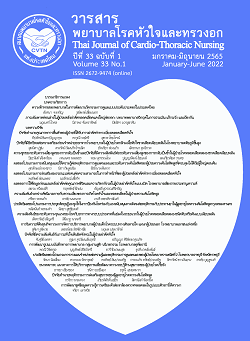A model of enhancing conversation skills in English for professional nurses, inpatient departments of Central Chest Institute of Thailand
Keywords:
enhancing skill requirement, english conversation, professional nurses, inpatient departmentAbstract
This descriptive research study aimed: to analyze problems identified with, causes of, and training requirements for enhancing English conversation skills to create a model for enhancing their English conversation skills, and to evaluate the appropriateness of the developed model. The samples who worked in inpatient departments and were selected by purposive sampling were divided into two groups. The first group of data collection consisted of 12 professional nurses who attended a focus group discussion. The second one included all samples who responded to an English conversation questionnaire. Research tools comprised three types: a focus group discussion guideline, the English conversation questionnaire aligned with nursing activities, and a model appropriateness questionnaire. Data were analyzed by descriptive statistics and content analysis.
The results of this study were as follows. 1) Most nurses reported limited usage of English conversation skills. Three top causes of this shortcoming included (1) the nurses themselves were embarrassed, lacked confidence, and did not dare to speak English; (2) their workplace provided insufficient support; and (3) the environment did not allow an opportunity and few chances to practice conversation. The model included: 1) foreign teachers who could speak Thai and practically practice teaching-learning methods. 2) This model was formulated based on evolving problems. Causes, and the nurses’ demands with blended learning which included both learning and practicing: The theoretical section adopted developed 20 English conversations about nursing activities, face-to-face small group learning, role-playing, and self-learning. The practical section was divided into 2 categories: (1) practicing with simulation applying, in-service training by conversing about everyday subjects, confidence encouragement, and change of shift reporting; and (2) training during work time through English conversation of nursing activities employment, preceptor supervision system, paper presentation; and study tour abroad. Finally, 3) the model of enhancing their conversation skills in English was appropriate at 99.31%.
References
Department of Health Service Support. Thailand Development Strategy for Medical Hub (2017-2026), 2016 [cited 2021 October 15]. Available from https://hss.moph.go.th/fileupload/2560-102.pdf. (in Thai).
Chetsadanuwat K. Needs of English skills of Thai nurses working in international hospitals accredited by JCI in Bangkok area. Language Education and Acquisition Research Network Journal. 2018; 11(1): 26-46. (in Thai).
Fredrickson, Terry L. Speak English Clearly: British and American Pronunciation for Thai Speakers of English. Bangkok, Post Publishing. 2017: 5-14.
Chooma T. The development of English for speaking communicative competency with communicative strategies. Mahachula Academic Journal. 2016; 3(1): 125-37. (in Thai).
Moulthadee S, Khanayot T, Worainin C. Developing English speaking skills of grade 11 students through role play activities. Humanities and Social Sciences Journal of Graduate School, Pibulsongkram Rajabhat University. 2016; 10(1): 68-83. (in Thai).
Kho-on W. Enhancing communication skills of prathomsuksa 4 students using the situation-based learning [The Thesis of Master of Education, Department of Curriculum and Instruction]. Bangkok: College of Education Science, Dhurakij Pundit University. 2017. (in Thai).
Kunlaka S, Purivittayatheera K. Developing English competency in nursing student. Rama Nurse Journal. 2016; 22(2): 123-33. (in Thai).
Corrizzato S, Goracci G. English for nursing: the importance of developing communicative competences. Journal of Teaching English for Specific and Academic Purposes. 2013; 1(2): 177-84.
Yongwikai W. Development of English language capabilities of Thai nurses to support the sustainable medical center. Stamford Journal. 2013; 5(1): 155-9. (in Thai).
Crawford T, Candlin S. A literature review of the language needs of nursing students who have English as a second/other language and the effectiveness of English language support programs. Nurse Education in Practice Journal homepage. 2013; 13: 181-5.
Chatsakul C, Siritharangsri B, Tangkittitaworn S, Chotipitayasunon C. Development of a preparation program for knowledge, attitude, and skills for ASEAN community of nurses in Chonpratan Hospital. Journal of Nursing, Siam University. 2016; 17(33): 71-88. (in Thai)
Central Chest Institute of Thailand. Information of Central Chest Institute of Thailand. Nonthaburi. 2020: 10-8. (in Thai).
Khammani T. Science of teaching. 21st ed. Bangkok: Chula longkorn university printing; 2017: 222-69. (in Thai).
Department of Medical Services. Appraisal of guidelines for research & evaluation II; AGREE II. Nonthaburi: Department of Medical Services. 2013: 1-57. (in Thai).
Chirwatkul S. Qualitative research: Qualitative study in nursing.2nd ed. Bangkok: Witayapat. 2012: 53-4. (in Thai).
Buosonte R. Qualitative Research in Education. 4thed. Bangkok: Chulalongkorn University Printing; 2013: 153-350. (in Thai).
Wibulsilp D. Knowledge of English for primary education teachers in elementary English teaching series teaching document, unit 6 of education program. In: Sukwiwat M, Iamsupasit P, Kaew-opas T, Akkaramas S, Kutin P, editors. Teaching English in Elementary Schools. 6th. Nonthaburi: Sukhothai Thammathirat Open University Press; 2013: 343-416. (in Thai).
Chuachai S. Using Social Media in Blended Learning. Journal of Industrial Education. 2017; 17(3): 214-21. (in Thai).
Von Bormann S., et al. Relationship between personal factors, attitude, knowledge and English skills of health professionals working in health service regions of the thai ministry of public health. Nursing Journal of The Ministry of Public Health. 2021; 31(1): 199-210. (in Thai).
Bootchyy T, and Bootchui, P. Blended Learning Design in Communicative English Language Teaching for Learners in Higher Education in the Digital Age. Education and Communication Technology (ECT Journal). 2021; 16(1), 205-10. (in Thai).
Thangkabutra T. The performance of computer and communications technology undergraduate students for Blended learning model. Integrating ASEAN Online Learning: Policy and Process. 2012: 63-7. (in Thai).
Dangwal, K. L. Blended learning: An innovative approach. Universal Journal of Educational Research. 2017; 5(1): 129-36. (in Thai).
Buosonte R. A mixed of research and evaluation. Bangkok: Asia Pacific Printing Corporation; 2012. p. 15-37. (in Thai).
Downloads
Published
How to Cite
Issue
Section
License
Copyright (c) 2022 Thai Journal of Cardio-Thoracic Nursing

This work is licensed under a Creative Commons Attribution-NonCommercial-NoDerivatives 4.0 International License.
บทความนี้ยังไม่เคยตีพิมพ์หรืออยู่ในระหว่างส่งไปตีพิมพ์ในวารสารอื่น ๆ มาก่อน และกองบรรณาธิการขอสงวนสิทธิ์ในการตรวจทาน และแก้ไขต้นฉบับตามเกณฑ์ของวารสาร ในกรณีที่เรื่องของท่านได้ได้รับการตีพิมพ์ในวารสารฉบับนี้ถือว่าเป็น ลิขสิทธิ์ของวารสารพยาบาลโรคหัวใจและทรวงอก






